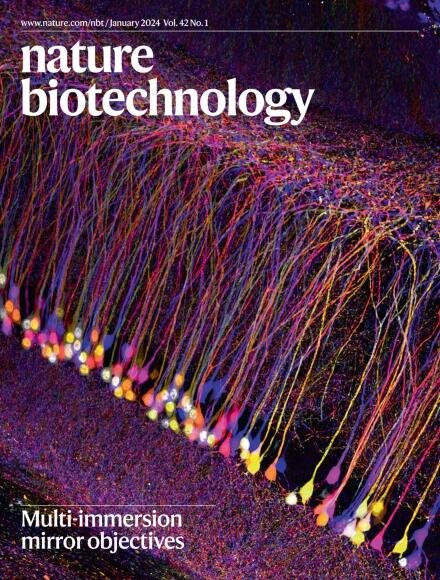Generation of modified cows and sheep from spermatid-like haploid embryonic stem cells.
IF 41.7
1区 生物学
Q1 BIOTECHNOLOGY & APPLIED MICROBIOLOGY
引用次数: 0
Abstract
In rodents, injection of haploid androgenetic embryonic stem cells (haES cells) into intact oocytes enables full-term development of offspring. The value of this method in research and genome engineering has not been replicated in ruminants because ruminant haES cells are yet to be obtained. Here we report the derivation of cow and sheep haES cells and their application to generate offspring by a method we call intracytoplasmic haES cell injection (iCHI), in analogy with intracytoplasmic sperm injection. Ruminant haES cells display characteristics of formative-state pluripotency and differentiate into the three germ layers both in vitro and in vivo. Ectopic expression of protamine in haES cells converts their nuclei into a spermatid-like structure and improves full-term development of iCHI embryos, a method we call protamine iCHI (Pro-iCHI). We also combine Pro-iCHI and prime editing to generate gene-modified cows and sheep. Overall, Pro-iCHI provides a promising approach for production of genetically modified livestock.用精子样单倍体胚胎干细胞改造牛羊。
在啮齿类动物中,将单倍体雄激素胚胎干细胞(haES细胞)注射到完整的卵母细胞中可以使后代足月发育。这种方法在研究和基因组工程中的价值尚未在反刍动物中得到复制,因为反刍动物尚未获得es细胞。在这里,我们报告了牛和羊haES细胞的衍生和它们的应用产生后代的方法,我们称之为胞浆内haES细胞注射(iCHI),类似于胞浆内精子注射。反刍动物胚胎干细胞在体外和体内均表现出形成态多能性,可分化为三种胚层。鱼精蛋白在haES细胞中的异位表达将其细胞核转化为精细胞样结构,并促进iCHI胚胎的足月发育,我们将这种方法称为鱼精蛋白iCHI (Pro-iCHI)。我们还将Pro-iCHI和prime编辑结合起来,产生了基因修饰的奶牛和绵羊。总之,Pro-iCHI为生产转基因牲畜提供了一种很有前途的方法。
本文章由计算机程序翻译,如有差异,请以英文原文为准。
求助全文
约1分钟内获得全文
求助全文
来源期刊

Nature biotechnology
工程技术-生物工程与应用微生物
CiteScore
63.00
自引率
1.70%
发文量
382
审稿时长
3 months
期刊介绍:
Nature Biotechnology is a monthly journal that focuses on the science and business of biotechnology. It covers a wide range of topics including technology/methodology advancements in the biological, biomedical, agricultural, and environmental sciences. The journal also explores the commercial, political, ethical, legal, and societal aspects of this research.
The journal serves researchers by providing peer-reviewed research papers in the field of biotechnology. It also serves the business community by delivering news about research developments. This approach ensures that both the scientific and business communities are well-informed and able to stay up-to-date on the latest advancements and opportunities in the field.
Some key areas of interest in which the journal actively seeks research papers include molecular engineering of nucleic acids and proteins, molecular therapy, large-scale biology, computational biology, regenerative medicine, imaging technology, analytical biotechnology, applied immunology, food and agricultural biotechnology, and environmental biotechnology.
In summary, Nature Biotechnology is a comprehensive journal that covers both the scientific and business aspects of biotechnology. It strives to provide researchers with valuable research papers and news while also delivering important scientific advancements to the business community.
 求助内容:
求助内容: 应助结果提醒方式:
应助结果提醒方式:


